INDIGENOUS BUSINESS AUSTRALIA




Desirae works in our Loan Management Team in our Brisbane Office on Turrbal and Yuggera Country. 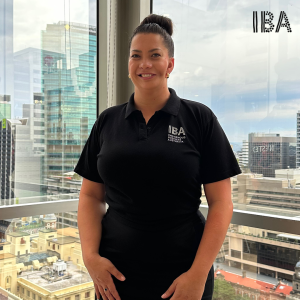
I am a Maori woman who was born in Australia but was raised in Hamilton, New Zealand. I have been working in the collections industry for 13 years. Eventually I ventured to IBA around three years ago and joined the Brisbane Loan management team.
My role here at IBA is a Principal Loan Management Officer. This is a key role within the Loan Management team, building rapport with our borrowers, providing hardship assistance and solutions to support our borrowers to remain in home ownership. In addition to my role, I also facilitate Budgeting and Understanding Credit workshops online and worked 11 months in an acting Assistant Manager role within Loan Management.
I love working at IBA because of the connection to culture, and the values we have align with my own personal beliefs. I especially love the aspect of helping our borrowers, networking and how we continue to find ways to grow as an organisation.
I resonate with dragonflies. The dragonfly has been a symbol of happiness, new beginnings, and change. They are known to only live for one day and are a reminder to live your life to the fullest and make the most of each moment.
On the recent episode (#110) of Black Magic Woman, Mundanara Bayles hosted Priscilla Mason, a proud Worimi woman and one of the directors of Indigeco. Priscilla talked about her passion for promoting employment opportunities for Indigenous individuals and communities.
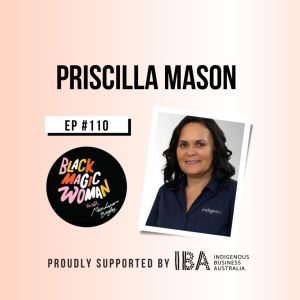
Started in 2017 with funding provided by IBA via a start-up loan package, Indigeco is a Supply Nation certified business that specialises in recruitment across both regional and metropolitan areas.
“Money was tight, but IBA took a chance on me. I can’t thank them enough,” says Priscilla.
With a start from humble upbringings and experience in the construction industry, Priscilla and her husband, Todd, saw the opportunity for growth in Aboriginal employment. In the beginning they started off on small construction sites, with only two labours. Now they provide several services ranging from employment, consulting on major construction projects and more.
The business now also has a training side of things with MobReady, which has VET accreditation to skill up Aboriginal and Torres Strait Islander youth to find career pathways in the labour hire space.
Indigeco continues their relationship with IBA as they grow. They use our invoice financing, a service that helps our customers whose cash flow can’t keep up with their growth.
“I still use them (IBA) today. They are fantastic,” says Priscilla.
Find out more about Indigeco’s story through the vodcast or visit their website, indigeco.com.au.
~~~~~~~~~~~~~~~~~~~~
IBA is proud to sponsor a series of strong women in business for this year’s Black Magic Woman pod- and vod-casts. If you would like more info on all the Black Magic Woman yarns, visit the website, blackmagicwoman.com.au/iba-partnership-series/.
To find out more about how you can start or grow a business, visit iba.gov.au/business/.
Did you know that IBA offers so much more than just providing loans? Even before you put in an Expression of Interest (EOI) for a home loan, we are here for you.

IBA’s Home Ownership program offers a series of workshops which provides Aboriginal and Torres Strait Islander people, who are interested in home ownership, with the information and tools to move forward.
The workshops are an excellent opportunity to ask questions and gain valuable knowledge and confidence to navigate the process.
“Workshop attendees will better understand IBA’s home loan products, the assessment process including timeframes, home loan eligibility criteria and how to identify potential barriers and use the information to get financially ready.” says IBA’s Jenny Pepper, , who runs many of the workshops.
“Completing a home loan application takes time and effort to gather and collate information. By providing the option to find out more information through our workshops, our customers are in a better position to prepare themselves well for home ownership.”
“Thanks heaps for the information,” says recent IBA Home Ownership workshop attendee Catelyn. “This will be helpful in moving forward and planning ahead. It brings me hope that home ownership is possible if I follow the right steps”.
Catelyn is looking forward to learning more, and putting this learning into practice. After the first workshop she also signed up for ‘Create a Budget' and 'Understanding Credit' workshop.
Another attendee Tiffany, agrees. “‘We enjoyed the session and it has given us the confidence and information to continue to work towards home ownership in the next 18 months.”
Workshops are mainly run online, customers are beginning to recognise the benefits these workshops provide and have been attending in droves, with average 30-50 per session. From time-to-time we also offer face-to-face workshops in limited locations.
Workshops include:
Find out about IBA’s workshops
Aleksandra - Alex currently works in the Legal Team at our Sydney Office on beautiful Gadigal Country. 
I was originally born in Croatia and moved to Australia when I was five, I can’t imagine living anywhere else. Later, I studied Law and Science with a major in Biology at Western Sydney University for about six years.
I completed internships and learned about Native Title and Indigenous Rights through Aurora Internships. I was placed in different areas and through my internship experience I learnt the significance of connection and relationships between Aboriginal and Torres Strait Islander peoples and country.
From there I applied to Indigenous Business Australia and started as a paralegal until I got my practicing certificate, now I am where I am today.
I originally started out as a paralegal until I gained my certificate to practice law and then eventually became a lawyer for the Legal team.
As a junior on the team, I am fortunate to work with the incredible team members on complex transactions. I also get to do a variety of tasks like drafting agreements, drafting loans, and doing legal research so every day is different. I particularly enjoy learning about privacy matters. Everyone in the team is so skilled and it is a real privilege to learn from them.
There’s so much to like about IBA, I feel like I’ve won the lottery. Everyone is so warm and welcoming, working at IBA feels like I’m making an impact for the better. The culture here and the variety of work makes me feel lucky to be here.
My guilty pleasure is a show called Kitchen Nightmares. I watch YouTube clips of the show but the person who reposts them uses Gen Z humour for the clip titles.
Black Arc Industries are a 100% Indigenous owned business in Alice Springs NT that does custom welding, modifications, and repairs on steel, stainless steel, and aluminium. 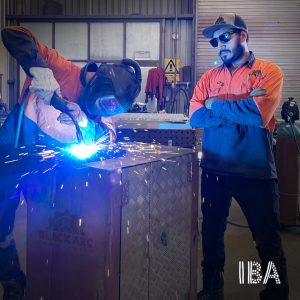
Hayden Jude is a proud Batcho man of the Larrakia family and the owner of Black Arc Industries. He talked to IBA about the hard work of running a business and how to keep things real when it’s a family business.
What’s the best thing about owning your own business?
The best thing about owning your own business is that you get to be your own boss. You get to have the freedom to make decisions that align with your personal values and goals.
I also have opportunity to make a positive impact on the lives of our clients and employees. By creating a positive work environment and providing quality products and services, you can help others achieve their own goals and aspirations.
How has IBA helped you and/or your business?
We used a business loan to purchase a truck, trailer, and excavator, which have been valuable assets for the business.
IBA believed in me and my business plan and worked alongside us to get things happening. Through IBA we have also been put in contact with various other organisations which has been instrumental in the success of the business.
If yours is a family business, what’s the secret to making it work?
Firstly, you need to like them [haha]. 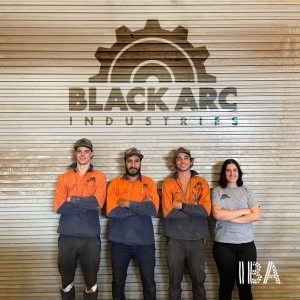
You need to have good communication and boundaries in place!
Find out more about Black Arc Industries: blackarc.com.au/ or instagram.com/blackarc_industries/.
Find out more about IBA business support.
Check out the second installment of the new vodcast series that we're partnering on with Black Magic Woman! In this episode, host Mundanara Bayles yarns with educator and community leader Tanyah Nasir on beautiful Larrakia country.
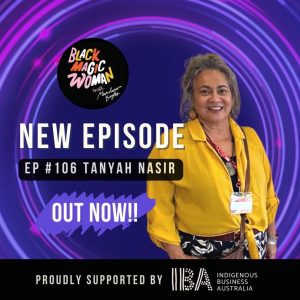
Black Magic Woman explores issues of importance to First Nations people and communities. and we've partnered on a number of episodes with topics from housing, business, youth, women, investing, financial literacy, economic development and COVID-19 recovery.
Episode 106 features Tanyah Nasir, a Darwin woman with connections to the Garrawa, Djugun, and Tiwi language groups. Tanyah is an educator with over 25 years’ experience, and prides herself on understanding the approach and methodology required to achieve success as Indigenous people.
Her program - 'Rise Up' provides a unique opportunity for First Nations people to reflect on their distinctive lived reality and the issues they encounter on a daily basis. The Rise Up program also facilitates critical thinking and self-reflection to encourage and support personal change and social transformation to create the life they want.
Black Magic Woman is accessible on all major platforms including YouTube, Instagram, Apple Podcasts, Spotify, Twitter, LinkedIn, and Facebook.
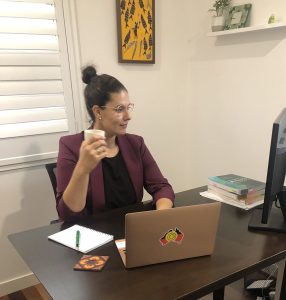
Angie had been thinking about starting her own writing and editing business for years. Then in early 2021, after a year of working from home in her salaried position and facing indefinite restrictions to meeting up with colleagues, she decided to take the leap.
IBA supported Angie Faye Martin, a Kooma/Kamilaroi woman, to get started with a business loan that allowed her to cover the costs of essential office equipment.
Angie acknowledged, “Start-up business expenses for a primarily online freelance business add up quickly. In addition to hardware, I had to purchase cloud storage, domains, insurance, legal advice and memberships to professional organisations and editing resources and style guides.”
Now, almost two years later, Versed Writings is a thriving business with a loyal client base and a multitude of business services. Her clients have included academics within Australia and overseas, a number of state and federal government departments, some large not-for-profits and numerous fictional authors.
Angie’s business is built on a passion for meaningful, tailored streamlined prose – whatever the purpose or whoever the audience.
“I believe meaning matters most. If you’re clear on what you want to communicate and the intention of your message before you sit down to write, the words will flow effortlessly,” said Angie.
Versed Writings offers content writing, copyediting and cultural sensitivity editing services.
“I started off mainly doing copyediting for academic journal articles and annual reports because that is my comfort zone and I expanded from there,” said Angie.
In a matter of months, Angie realised the high demand for content writing and cultural sensitivity editing from an Aboriginal and Torres Strait Islander perspective. She sought out the mentorship of Ngiyamppa academic Dr Mark Lock, who is an expert in the field of cultural safety editing, and IBA supported weekly mentoring sessions for three months so Angie could build her knowledge, skills and confidence in this area of growing demand.
Angie is signed with HarperCollins for her novel, Melaleuca, to be released in 2024, an outback noir crime thriller about an Aboriginal police woman called out west to investigate the murder and disappearances of Aboriginal women.
Business support comes in many different forms. IBA provides capability building, finance, and workshops for entrepreneurs and businesses wanting to develop their ideas. Find out more at iba.gov.au/business/starting-a-business.
An interview by our CareerTrackers intern Zenae Powell.
Meet Eric Kalolo, Communications Associate.
Where are you from?
My heritage hales from the Pacific Island nation of Samoa, but I was born in New Zealand and moved to Australia when I was eight years of age. I am currently living in Brisbane, home to the Turrbal and Yuggera people. 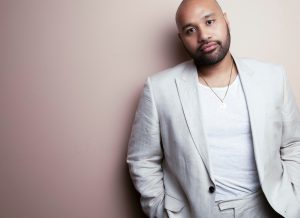
What is your role at IBA?
I am the newly appointed Communications Associate for Public and Government Relations as of November and it’s kind of like a dream come true. At the moment I’m currently in the process of taking over the IBA internal news, producing media releases, working on communications briefs and strategising for 2023.
Prior to this role I was part of the Loan Management Team in Housing. There I assisted customers with payment arrangements to rectify arrears, provided hardship to customers experiencing financial difficulty, managed a portfolio of customers from early-stage arrears through to back-end recoveries, assisted with workshop administration, operations and facilitation, and assisted with ad hoc management tasks.
I always wanted to work in communications and I’m extremely excited to be a part of the team as the new Communications Associate.
What was your journey before IBA?
Prior to IBA I was employed by Macquarie Bank and Bank of Queensland. During this time, I also started my fashion label. Under the business I was a freelance fashion stylist, tour promoter and creative director. The business has allowed me the opportunity to work with many talented creatives, TV personalities, musicians, and public figures but most importantly it allowed me the opportunity to express myself creatively and give me the skills to bring to my communications role. In 2019 a friend told me about an opening at IBA within the homes team. Knowing that (the role) was working with Indigenous people, I felt that I had a lot to offer, so I applied and was successful. The experience so far with IBA has been amazing, I’m excited to be in my current role.
Why is working at IBA, important to you?
Working at IBA has opened my eyes to the work that is needed in closing the gap. I want to be a part of the process, I want to help educate our customers on ways they can build generational wealth and financial stability. I believe it is important to share the successes of our customers, so it encourages other First Nations people to start thinking about generational wealth, financial stability and to build a brighter future for the younger generation.
What is one thing you can’t live without?
Sadly, I can’t live without Uber Eats. Although my doctor has advised me otherwise, who doesn’t like takeaway delivered to their door?!
We recently caught up with South Australian home loan customers, Dylan and Jen. They were delighted to share their positive experience with IBA and what being in their own home means to their family. They wanted a bigger home for their growing family and were weary of the insecurity of renting. Since getting in touch with IBA they haven’t looked back.
"It was a real achievement to buy a house," says Jen. "And we're not just a number to them (speaking about IBA). They shared in our excitement. I'm happy, we're happy. it's exactly what we wanted."
Zakpage, a First Nations creative agency, produced this lovely video where Dylan and Jen show their home and tell their story.
Check out the gorgeous artwork Dylan stands in front of towards the end of the video. Three paintings were gifted to his parents by Warlpiri artist Aileen Long, which in turn have now been gifted to him and his siblings. So, it was an extra-special moment for Dylan when he was able to hang it in his own family home.
If like Dylan and Jen, you'd like to buy your own home, first check out IBA's free workshops to find out about budgeting and understand what it takes to start the process.
When Elandra and Azra moved into their Rockhampton QLD home in April this year, they couldn’t be happier with their well-deserved purchase.
It was the first time the recently married couple had lived together. So reluctant were they to spend money on renting while they reached their savings goals, that Elandra continued to live with her parents and Azra boarded, until they bought their home.

Kabal Barada woman Elandra, who works as a Registered Nurse at an emergency medical centre says, “We got engaged and then we got to start looking for a place to live. We heard about IBA and registered an EOI.”
It was several months before they were added to the waiting list, but Elandra says that continued support from IBA throughout kept them going.
“IBA told me I had to get my savings up before I could go any further. So, then we had a goal in mind and IBA helped us with strategies to get there. IBA even checked in with us after a few months to see how we were going and trying their very best to help us reach the goals.”
They also used this time to go to open homes and see what they could buy with their budget.
The savvy couple chose a future-proofed home with lots of room to grow.
They acknowledge that IBA’s low deposit requirements helped them get the home they dreamed of. “Without IBA we would have had to wait much longer before we could buy what we wanted. With IBA we were able to buy somewhere to move right in,” says Elandra.
Elandra and Azra don’t do things by halves - and got married the same fortnight as their completion. They moved in after they got back from honeymoon and are excited with this start to begin the rest of their lives together.
“Every cent we spend is going to our mortgage. It’s really nice, knowing it’s going to our future, not paying someone else’s mortgage.
“Now we can build our lives together - and if we want to, we can build on the home.”
While the home didn’t require any immediate work, Teacher’s Aid Azra is a keen gardener and in their spare time they’re working on the outside area and making it an entertaining space.
“IBA was really helpful throughout and was really in our corner,” says Elandra. “If anyone else is thinking about buying a home through IBA I would say - go for it. We didn’t think we would get this beautiful home. If that’s your goal, you can achieve it.”